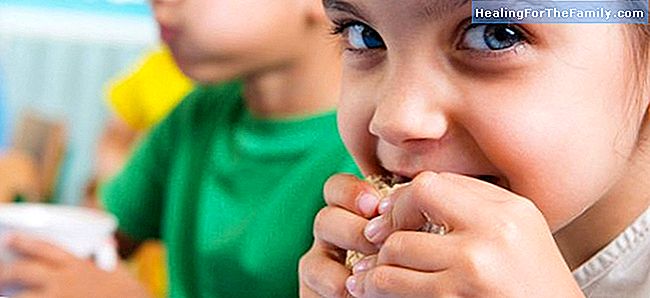Why children eat better at school
There are unapologetic children or those who generally eat poorly at home, however, they become good eaters, as if by magic when they eat at school. Many parents do not understand and sometimes they get offended, because children prefer school menus to those who prepare them with love and dedication
There are unapologetic children or those who generally eat poorly at home, however, they become good eaters, as if by magic when they eat at school. Many parents do not understand and sometimes they get offended, because children prefer school menus to those who prepare them with love and dedication at home.
Psychologist Silvia Álava explains why this attitude in children and how it is possible that it is so widespread in children.
Children who eat poorly at home, eat well at school

Is it true that when a child does not eat, it is best to let them eat at school?Letting a child eat at school because he does not eat well at home is a basic error. In the education of children, parents are responsible and teaching them to eat is the task of the parents. Children have to learn to eat from a young age before going to school and at school, in which case, they can reinforce certain behaviors. But it is not worth leaving all education to school.
Is it recommended that the child eat in the school dining room as punishment?
We can not threaten or punish a child saying that if you do not eat well, you will go to the school dining room, because we do not know if at a certain moment we will have to leave him to eat in the dining room due to a problem of incompatibility of schedules or other topics.
Experience shows that some children eat better at school. Why?
Psychologists find many cases of children who eat much better at school than at home. In fact, when we work with children who have problems with food, the main source of problems is dinner, since the food is made at school. In the dining room, children do much better because, in the presence of other children and caregivers, they think 'I will not be the only one who does not eat'.
In addition, in the school the usual dynamic is that there is a set time to eat and, when the time is up, we go to the patio. If the child has not finished, he is finished eating and does not go out into the yard with the others. This guideline helps them learn to eat in the established time. Then comes the time to have dinner at home with their parents and how we do not reproduce the same situations and know that, in the end, parents tend to be softer and they will give in, they do not behave like in school.
At school, food is not changed, at home many times yes. It is important not to change it, the child has to see that there is one. Although it may be easier for a mother, if something does not like the child, to do something else, that is not optimal learning. The child must learn that what is on the plate is eaten, the amount that is on the plate and that the food is not changed. Although it is very easy to change the food, we really do not change it.
Why do some children behave better at school than at home at lunchtime?
By the way of driving the problem. If at school they do not allow certain behaviors such as eating with their hands, throwing bread crumbs to their classmates, fighting with the child in front or next door, at home we should not allow it either. Parents should tell the children 'if you do this, we will not eat with you or go to dinner alone'. At school, there are also times, and at home we must put those times and, depending on the problem of the child, assess whether we already remove the food and finished or stay alone until you finish eating without paying attention.
Parents are responsible for the children's education and by being firm and calm they can do a lot to improve their children's meals and dinners.












